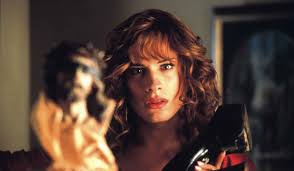Eye For Film >> Movies >> Bad Education (2004) Film Review
Bad Education
Reviewed by: Jennie Kermode

We first see him in his office, trying to concentrate on work, trying to interact politely with the former lover whose heart he's just broken. We first truly see her on a stage, dolled up in sequins, crooning love songs and throwing roses into the crowd. This is a story about blackmail and murder, about manipulation and broken lives. It's classic film noir; except that, being the work of Pedro Almodóvar, much of it is shot in lurid colour, not all the girls are really girls, and not all the boys are what they claim to be, either.
Following the mainstream success of Talk To Her, Almodóvar received a great deal of critical praise, and it's curious to see how quickly most of those critics have forsaken him now that he's gone back to making the sort of film with which he made his name. Bad Education has been called crude and vulgar, garish and distasteful - yet these are all qualities which the director makes vital use of in order to tell his tale.

Of course, at times, he is trying to shock - that's because there are stories here which should shock us, but which, in a more sedate film, we might find it easier to maintain emotional distance from. And yes, his story centres around transsexual prostitutes and hustlers, but these are people who exist in the real world, with real problems, and Almodovar has always been a champion in telling their tales.
It would seem that this particular tale offends many people because, in recounting the effects of corruption, it presents characters who have been corrupted, who are not the perfect innocent victims whom we have come to idolise in modern western culture. Furthermore, the villains here are not wholly and simply villainous - though the heinousness of their crimes is not minimised, we see their perspectives, their self-justifications, and something of their motivations.
As with most film noir, this tale set against the background of a love story; in this case, a love which developed between two ten-year-old boys, the rebellious Enrique and the angelic choirboy Ignacio, during their school days. Though they don't make contact again for nearly two decades, Ignacio never forgets his passion, and Enrique, though curiously passionless himself, remains vulnerable to it. The separation of the boys follows the intervention of a paedophile priest, Father Manolo, who believes himself to be in love with Ignacio and tricks the boy into the first of the series of acts of prostitution which will come to define and destroy his life. The adult Enrique's sympathy for acts of revenge against this priest permits him to be drawn into a scheme and a relationship which threaten to destroy him.
It's difficult to say much more about the plot of this film without giving away too many of its twists and turns. What's really interesting is the way that Almodóvar keeps his complex characters consistent across all this shifting ground; how long it takes for us to get to know them, and then to start wondering who they are. David Lynch broke the mold of modern film noir by casting Naomi Watts in the traditionally male role in Mulholland Drive, and Almodóvar has done something similar here with the creation of a male femme fatale as devious, alluring and dangerously charismatic as any to have graced the silver screen before. The education which he provides to Enrique is far more potent than any delivered at school, and one is given cause to wonder about the strange factors which shaped his own.
Bad Education is a bold, challenging piece of film-making with a great deal to say about identity, obsession, and the forces which shape our lives. Like its characters, it is much more sophisticated than it might seem on the surface, and is undoubtedly deserving of a wider audience than it's likely to get.
Reviewed on: 11 Jul 2007




















